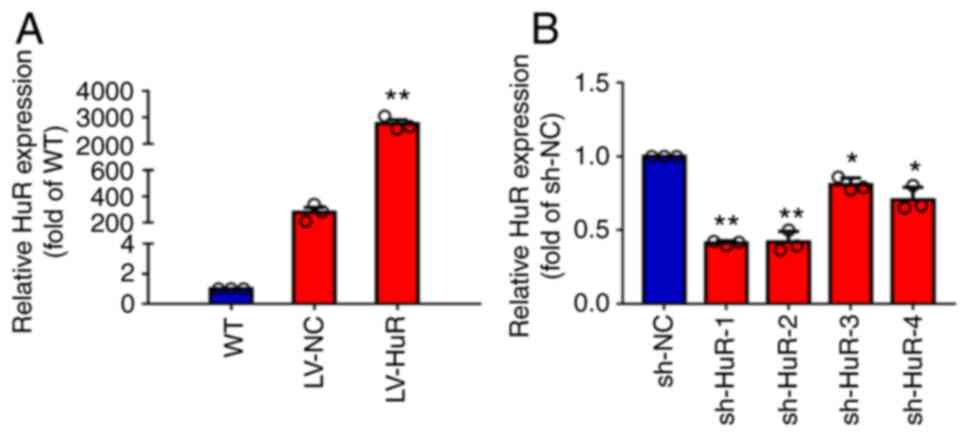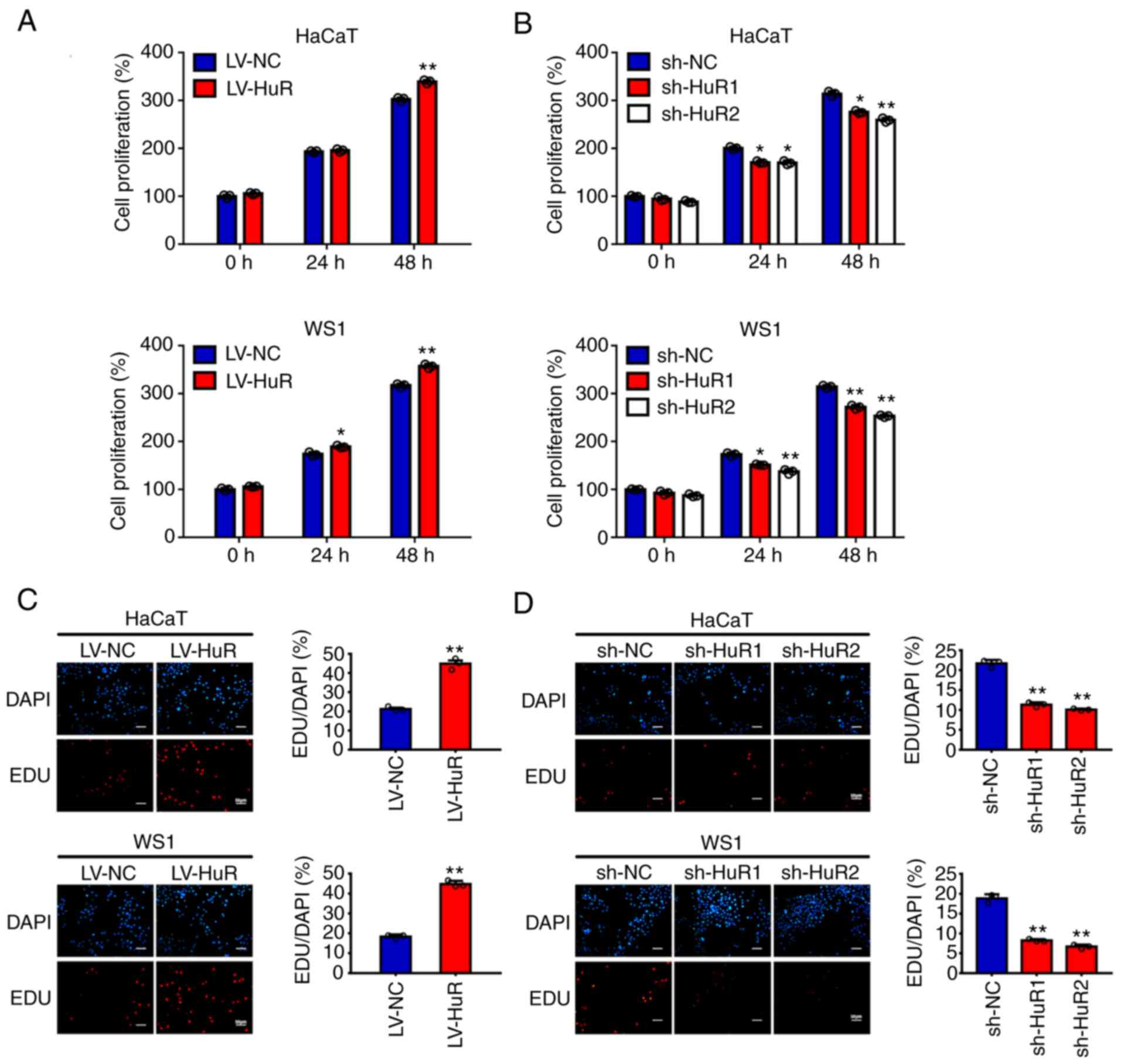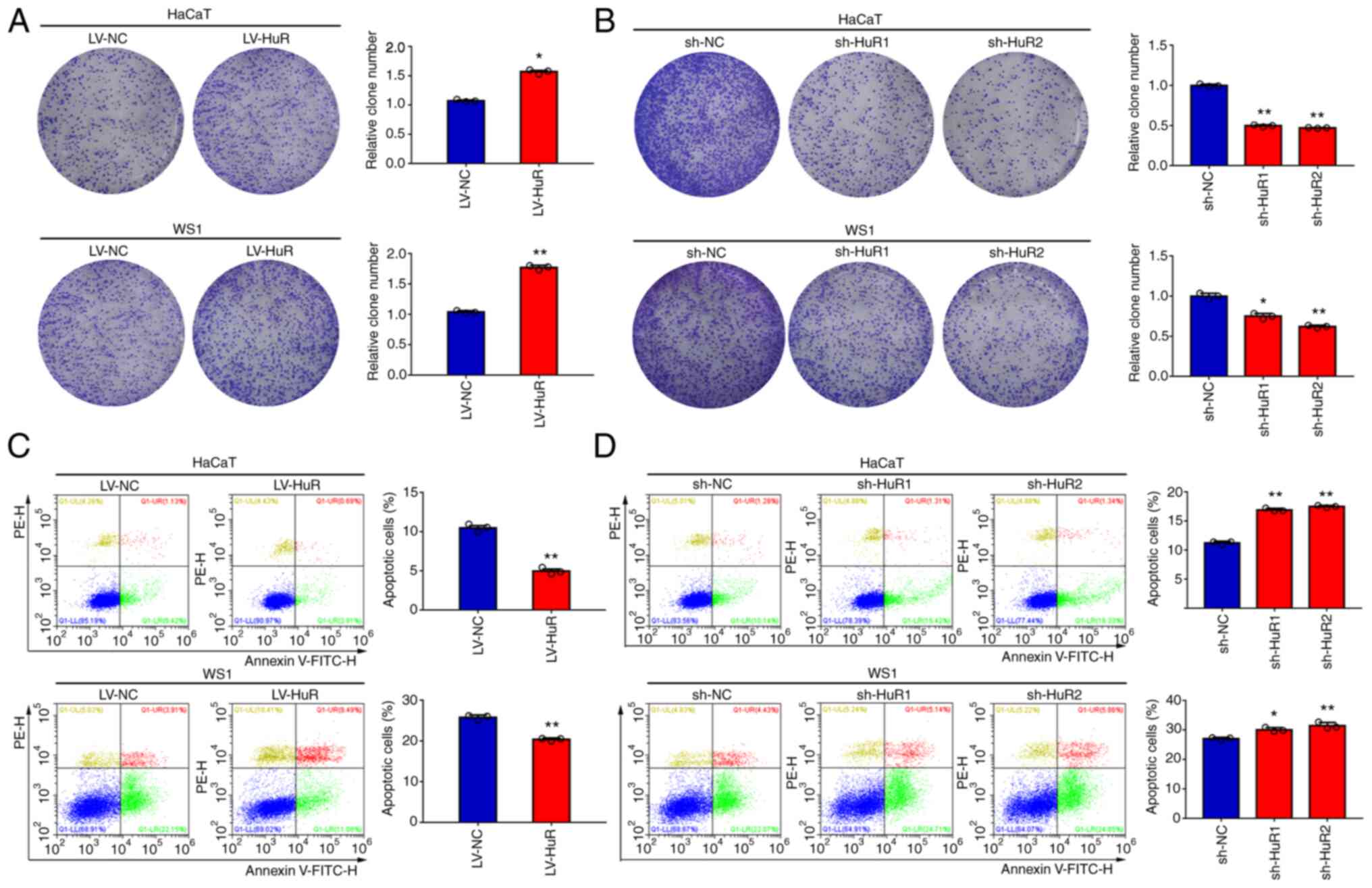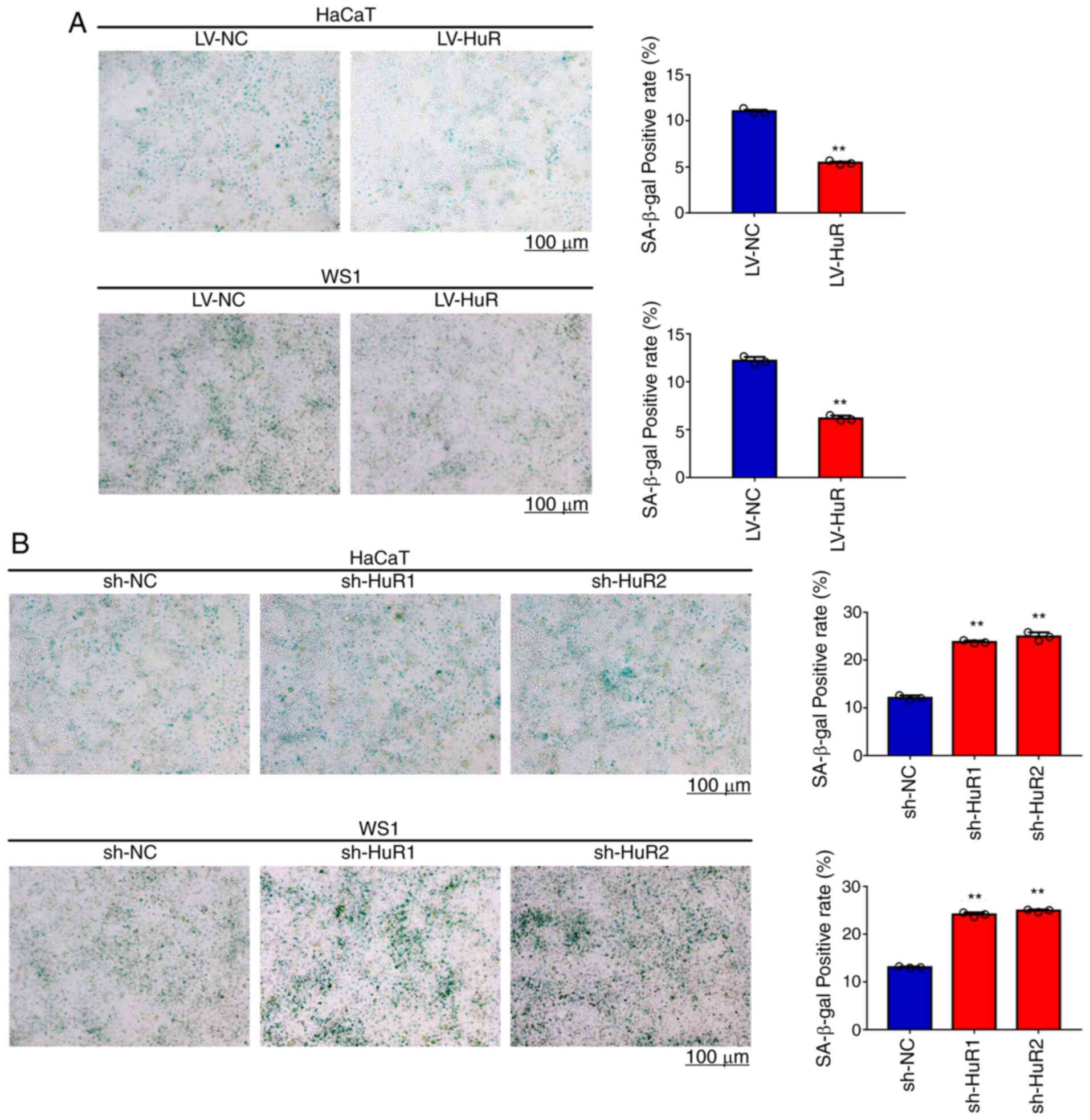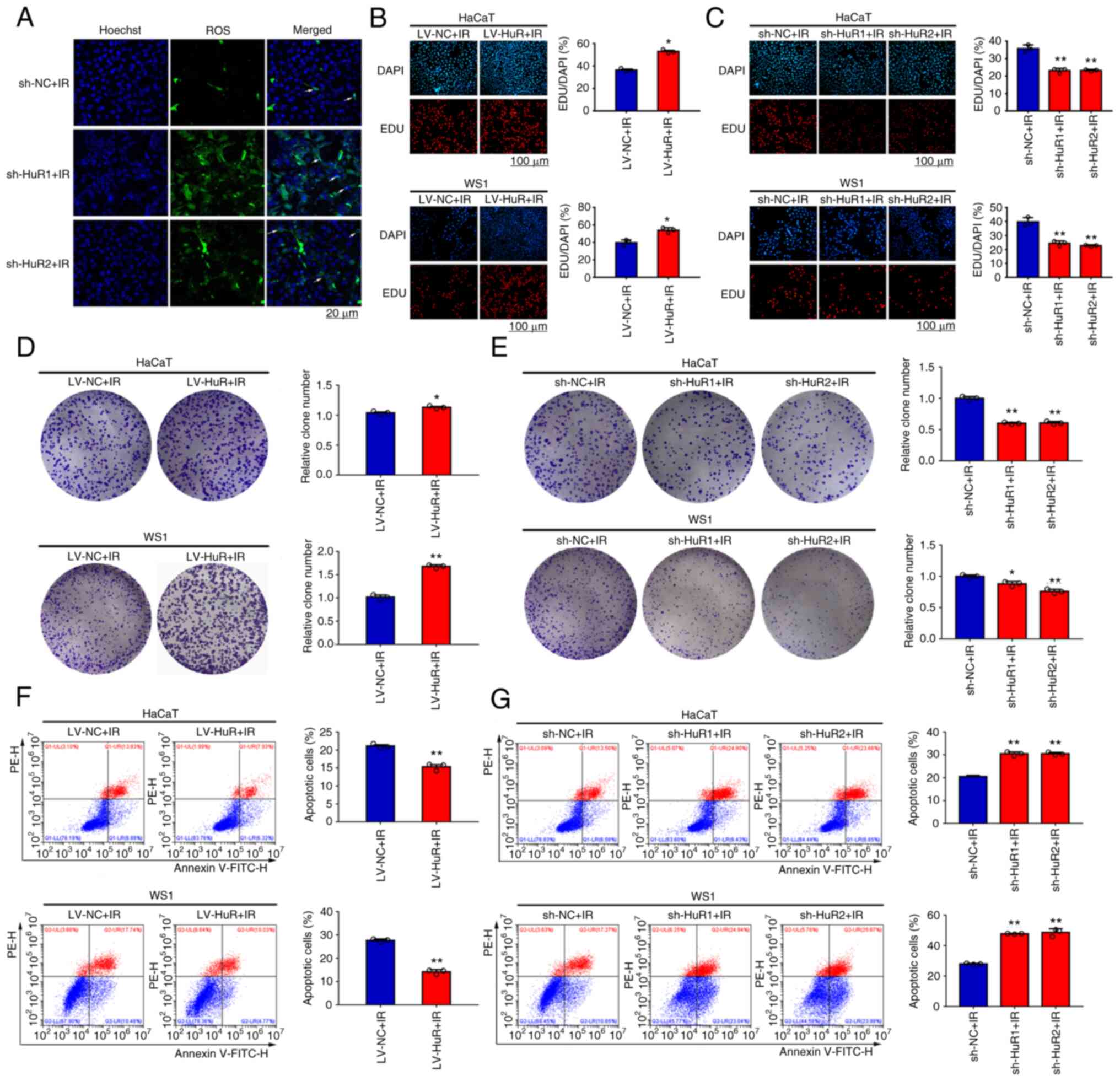|
1
|
Pope SD and Medzhitov R: Emerging
principles of gene expression programs and their regulation. Mol
Cell. 71:389–397. 2018.PubMed/NCBI View Article : Google Scholar
|
|
2
|
Zerdes I, Matikas A, Bergh J, Rassidakis G
and Foukakis : Genetic, transcriptional and
post-translational regulation of the programmed death protein
ligand 1 in cancer: Biology and clinical correlations. Oncogene.
37:4639–4661. 2018.PubMed/NCBI View Article : Google Scholar
|
|
3
|
Zhang Q and Cao X: Epigenetic regulation
of the innate immune response to infection. Nat Rev Immunol.
19:417–432. 2019.PubMed/NCBI View Article : Google Scholar
|
|
4
|
Hartman ML and Czyz M: MITF in melanoma:
Mechanisms behind its expression and activity. Cell Mol Life Sci.
72:1249–1260. 2015.PubMed/NCBI View Article : Google Scholar
|
|
5
|
Grammatikakis I, Abdelmohsen K and Gorospe
M: Posttranslational control of HuR function. Wiley Interdiscip Rev
RNA. 8(e1372)2017.PubMed/NCBI View Article : Google Scholar
|
|
6
|
Moutal A, White KA, Chefdeville A,
Laufmann RN, Vitiello PF, Feinstein D, Weimer JM and Khanna R:
Dysregulation of CRMP2 post-translational modifications drive its
pathological functions. Mol Neurobiol. 56:6736–6755.
2019.PubMed/NCBI View Article : Google Scholar
|
|
7
|
Buuh ZY, Lyu Z and Wang RE: Interrogating
the roles of post-translational modifications of non-histone
proteins. J Med Chem. 61:3239–3252. 2018.PubMed/NCBI View Article : Google Scholar
|
|
8
|
Schultz CW, Preet R, Dhir T, Dixon DA and
Brody JR: Understanding and targeting the disease-related RNA
binding protein human antigen R (HuR). Wiley Interdiscip Rev RNA.
11(e1581)2020.PubMed/NCBI View Article : Google Scholar
|
|
9
|
Wang X, Zhou X, Li G, Zhang Y, Wu Y and
Song W: Modifications and trafficking of APP in the pathogenesis of
Alzheimer's disease. Front Mol Neurosci. 10(294)2017.PubMed/NCBI View Article : Google Scholar
|
|
10
|
Han ZJ, Feng YH, Gu BH, Li YM and Chen H:
The post-translational modification, SUMOylation, and cancer. Int J
Oncol. 52:1081–1094. 2018.PubMed/NCBI View Article : Google Scholar
|
|
11
|
Estevez A, Zhu D, Blankenship C and Jiang
J: Molecular interrogation to crack the case of O-GlcNAc.
Chemistry. 26:12086–12100. 2020.PubMed/NCBI View Article : Google Scholar
|
|
12
|
Zhou H, Rao Y, Sun Q, Liu Y, Zhou X, Chen
Y and Chen J: MiR-4458/human antigen R (HuR) modulates PBX3 mRNA
stability in melanoma tumorigenesis. Arch Dermatol Res.
312:665–673. 2020.PubMed/NCBI View Article : Google Scholar
|
|
13
|
Andrade D, Mehta M, Griffith J, Oh S,
Corbin J, Babu A, De S, Chen A, Zhao YD, Husain S, et al: HuR
reduces radiation-induced DNA damage by enhancing expression of
ARID1A. Cancers. 11(2014)2019.PubMed/NCBI View Article : Google Scholar
|
|
14
|
Xu X, Song C, Chen Z, Yu CX, Wang Y, Tang
Y and Luo J: Downregulation of HuR inhibits the progression of
esophageal cancer through interleukin-18. Cancer Res Treat.
50:71–87. 2018.PubMed/NCBI View Article : Google Scholar
|
|
15
|
Mostaan LV, Tabari A, Amiri P, Ashtiani
MK, Mahdkhah A, Yazdani N, Khaniki M, Tabari A, Tavakkoly-Bazzaz J
and Amoli MM: Survivin gene polymorphism association with tongue
squamous cell carcinoma. Genet Test Mol Biomarkers. 17:74–77.
2013.PubMed/NCBI View Article : Google Scholar
|
|
16
|
Srikantan S and Gorospe M: HuR function in
disease. Front Biosci (Landmark Ed). 17:189–205. 2012.PubMed/NCBI View Article : Google Scholar
|
|
17
|
Hinman MN and Lou H: Diverse molecular
functions of Hu proteins. Cell Mol Life Sci. 65:3168–3181.
2008.PubMed/NCBI View Article : Google Scholar
|
|
18
|
Wang J, Wang B, Bi J and Zhang C:
Cytoplasmic HuR expression correlates with angiogenesis,
lymphangiogenesis, and poor outcome in lung cancer. Med Oncol. 28
(Suppl 1):S577–S585. 2011.PubMed/NCBI View Article : Google Scholar
|
|
19
|
Zhou Y, Chang R, Ji W, Wang N, Qi M, Xu Y,
Guo J and Zhan L: Loss of scribble promotes snail translation
through translocation of HuR and enhances cancer drug resistance. J
Biol Chem. 291:291–302. 2016.PubMed/NCBI View Article : Google Scholar
|
|
20
|
To KK, Leung WW and Ng SS: Exploiting a
novel miR-519c-HuR-ABCG2 regulatory pathway to overcome
chemoresistance in colorectal cancer. Exp Cell Res. 338:222–231.
2015.PubMed/NCBI View Article : Google Scholar
|
|
21
|
Zhang S, Wang W, Gu Q, Xue J, Cao H, Tang
Y, Xu X, Cao J, Zhou J, Wu J and Ding WQ: Protein and miRNA
profiling of radiation-induced skin injury in rats: The protective
role of peroxiredoxin-6 against ionizing radiation. Free Radic Biol
Med. 69:96–107. 2014.PubMed/NCBI View Article : Google Scholar
|
|
22
|
Wang W, Furneaux H, Cheng H, Caldwell MC,
Hutter D, Liu Y, Holbrook N and Gorospe M: HuR regulates p21 mRNA
stabilization by UV light. Mol Cell Biol. 20:760–769.
2000.PubMed/NCBI View Article : Google Scholar
|
|
23
|
Zhang J and Bowden GT: UVB irradiation
regulates Cox-2 mRNA stability through AMPK and HuR in human
keratinocytes. Mol Carcinog. 47:974–983. 2008.PubMed/NCBI View Article : Google Scholar
|
|
24
|
Livak KJ and Schmittgen TD: Analysis of
relative gene expression data using real-time quantitative PCR and
the 2(-Delta Delta C(T)) method. Methods. 25:402–408.
2001.PubMed/NCBI View Article : Google Scholar
|
|
25
|
Brand RM, Epperly MW, Stottlemyer JM,
Skoda EM, Gao X, Li S, Huq S, Wipf P, Kagan VE, Greenberger JS and
Falo LD Jr: A topical mitochondria-targeted redox-cycling nitroxide
mitigates oxidative stress-induced skin damage. J Invest Dermatol.
137:576–586. 2017.PubMed/NCBI View Article : Google Scholar
|
|
26
|
Xue J, Yu C, Sheng W, Zhu W, Luo J, Zhang
Q, Yang H, Cao H, Wang W, Zhou J, et al: The Nrf2/GCH1/BH4 axis
ameliorates radiation-induced skin injury by modulating the ROS
cascade. J Invest Dermatol. 137:2059–2068. 2017.PubMed/NCBI View Article : Google Scholar
|
|
27
|
Bellei B and Picardo M: Premature cell
senescence in human skin: Dual face in chronic acquired pigmentary
disorders. Ageing Res Rev. 57(100981)2020.PubMed/NCBI View Article : Google Scholar
|
|
28
|
Toutfaire M, Bauwens E and
Debacq-Chainiaux F: The impact of cellular senescence in skin
ageing: A notion of mosaic and therapeutic strategies. Biochem
Pharmacol. 142:1–12. 2017.PubMed/NCBI View Article : Google Scholar
|
|
29
|
Lee BY, Han JA, Im JS, Morrone A, Johung
K, Goodwin EC, Kleijer WJ, DiMaio D and Hwang ES:
Senescence-associated beta-galactosidase is lysosomal beta-
galactosidase. Aging Cell. 5:187–195. 2006.PubMed/NCBI View Article : Google Scholar
|
|
30
|
Kiang JG and Olabisi AO: Radiation: A
poly-traumatic hit leading to multi-organ injury. Cell Biosci.
9(25)2019.PubMed/NCBI View Article : Google Scholar
|
|
31
|
Soriano JL, Calpena AC, Souto EB and
Clares B: Therapy for prevention and treatment of skin ionizing
radiation damage: A review. Int J Radiat Biol. 95:537–553.
2019.PubMed/NCBI View Article : Google Scholar
|
|
32
|
Wang Y, Tu W, Tang Y, Momeni A, Longaker
MT and Wan DC: Prevention and treatment for radiation-induced skin
injury during radiotherapy. Radiat Med Protect. 1:60–68. 2020.
|
|
33
|
Lal P, Cerofolini L, D'Agostino VG, Zucal
C, Fuccio C, Bonomo I, Dassi E, Giuntini S, Maio DD, Vishwakarma V,
et al: Regulation of HuR structure and function by
dihydrotanshinone-I. Nucleic Acids Res. 45:9514–9527.
2017.PubMed/NCBI View Article : Google Scholar
|
|
34
|
Lv Z, He K, Shi L, Shi K, Jiang T and Chen
Y: Interaction between C2ORF68 and HuR in human colorectal cancer.
Oncol Rep. 41:1918–1928. 2019.PubMed/NCBI View Article : Google Scholar
|
|
35
|
de Silanes IL, Fan J, Yang X, Zonderman
AB, Potapova O, Pizer ES and Gorospe M: Role of the RNA-binding
protein HuR in colon carcinogenesis. Oncogene. 22:7146–7154.
2003.PubMed/NCBI View Article : Google Scholar
|
|
36
|
Hack NJ, Wride MC, Charters KM, Kater SB
and Parks TN: Developmental changes in the subcellular localization
of calretinin. J Neurosci. 20(RC67)2000.PubMed/NCBI View Article : Google Scholar
|
|
37
|
Schwaller B: Calretinin: From a ‘simple’
Ca(2+) buffer to a multifunctional protein implicated in many
biological processes. Front Neuroanat. 8(3)2014.PubMed/NCBI View Article : Google Scholar
|
|
38
|
Boehning D, Patterson RL, Sedaghat L,
Glebova NO, Kurosaki T and Snyder SH: Cytochrome c binds to
inositol (1,4,5) trisphosphate receptors, amplifying
calcium-dependent apoptosis. Nat Cell Biol. 5:1051–1061.
2003.PubMed/NCBI View Article : Google Scholar
|
|
39
|
Wu Y, Fabritius M and Ip C:
Chemotherapeutic sensitization by endoplasmic reticulum stress:
Increasing the efficacy of taxane against prostate cancer. Cancer
Biol Ther. 8:146–152. 2009.PubMed/NCBI View Article : Google Scholar
|
|
40
|
Lautz K, Damm A, Menning M, Wenger J, Adam
AC, Zigrino P, Kremmer E and Kufer TA: NLRP10 enhances
Shigella-induced pro-inflammatory responses. Cell Microbiol.
14:1568–1583. 2012.PubMed/NCBI View Article : Google Scholar
|
|
41
|
Providence KM, Higgins SP, Mullen A,
Battista A, Samarakoon R, Higgins CE, Wilkins-Port CE and Higgins
PJ: SERPINE1 (PAI-1) is deposited into keratinocyte migration
‘trails’ and required for optimal monolayer wound repair. Arch
Dermatol Res. 300:303–310. 2008.PubMed/NCBI View Article : Google Scholar
|
|
42
|
Kortlever RM, Higgins PJ and Bernards R:
Plasminogen activator inhibitor-1 is a critical downstream target
of p53 in the induction of replicative senescence. Nat Cell Biol.
8:877–884. 2006.PubMed/NCBI View Article : Google Scholar
|
|
43
|
Deotto ML, Spiller A, Sernicola A and
Alaibac M: Bullous pemphigoid: An immune disorder related to aging.
Exp Ther Med. 23(50)2022.PubMed/NCBI View Article : Google Scholar
|
|
44
|
Bhatia E, Kumari D, Sharma S, Ahamad N and
Banerjee R: Nanoparticle platforms for dermal antiaging
technologies: Insights in cellular and molecular mechanisms. Wiley
Interdiscip Rev Nanomed Nanobiotechnol. 14(e1746)2022.PubMed/NCBI View Article : Google Scholar
|
|
45
|
Burgio E, Piscitelli P and Migliore L:
Ionizing radiation and human health: Reviewing models of exposure
and mechanisms of cellular damage. An epigenetic perspective. Int J
Environ Res Public Health. 15(1971)2018.PubMed/NCBI View Article : Google Scholar
|
|
46
|
Barzilai A and Yamamoto K: DNA damage
responses to oxidative stress. DNA Repair (Amst). 3:1109–1115.
2004.PubMed/NCBI View Article : Google Scholar
|
|
47
|
Mehta M, Basalingappa K, Griffith JN,
Andrade D, Babu A, Amreddy N, Muralidharan R, Gorospe M, Herman T,
Ding WQ, et al: HuR silencing elicits oxidative stress and DNA
damage and sensitizes human triple-negative breast cancer cells to
radiotherapy. Oncotarget. 7:64820–64835. 2016.PubMed/NCBI View Article : Google Scholar
|
|
48
|
Suzuki H, Miyagaki T, Otobe S, Nakajima R,
Oka T, Takahashi N, Kabasawa M, Suga H, Yoshizaki A, Asano Y, et
al: Increased endocan expression in lesional skin and decreased
endocan expression in sera in atopic dermatitis. J Dermatol.
44:1392–1395. 2017.PubMed/NCBI View Article : Google Scholar
|
|
49
|
Zhang H, Yushkevich PA and Gee JC:
Deformable registration of diffusion tensor MR images with explicit
orientation optimization. Med Image Comput Comput Assist Interv.
8:172–179. 2005.PubMed/NCBI View Article : Google Scholar
|
|
50
|
Roudnicky F, Poyet C, Wild P, Krampitz S,
Negrini F, Huggenberger R, Rogler A, Stöhr R, Hartmann A,
Provenzano M, et al: Endocan is upregulated on tumor vessels in
invasive bladder cancer where it mediates VEGF-A-induced
angiogenesis. Cancer Res. 73:1097–1106. 2013.PubMed/NCBI View Article : Google Scholar
|
|
51
|
Moussion C, Ortega N and Girard JP: The
IL-1-like cytokine IL-33 is constitutively expressed in the nucleus
of endothelial cells and epithelial cells in vivo: A novel
‘alarmin’? PLoS One. 3(e3331)2008.PubMed/NCBI View Article : Google Scholar
|
|
52
|
Kim J, Kim W, Le HT, Moon UJ, Tran VG, Kim
HJ, Jung S, Nguyen QT, Kim BS, Jun JB, et al: IL-33-induced
hematopoietic stem and progenitor cell mobilization depends upon
CCR2. J Immunol. 193:3792–3802. 2014.PubMed/NCBI View Article : Google Scholar
|
|
53
|
Erdreich-Epstein A, Robison N, Ren X, Zhou
H, Xu J, Davidson TB, Schur M, Gilles FH, Ji L, Malvar J, et al:
PID1 (NYGGF4), a new growth-inhibitory gene in embryonal brain
tumors and gliomas. Clin Cancer Res. 20:827–836. 2014.PubMed/NCBI View Article : Google Scholar
|
|
54
|
Bonala S, McFarlane C, Ang J, Lim R, Lee
M, Chua H, Lokireddy S, Sreekanth P, Leow MKS, Meng KC, et al: Pid1
induces insulin resistance in both human and mouse skeletal muscle
during obesity. Mol Endocrinol. 27:1518–1535. 2013.PubMed/NCBI View Article : Google Scholar
|
|
55
|
Zhang CM, Chen XH, Wang B, Liu F, Chi X,
Tong ML, Ni YH, Chen RH and Guo XR: Over-expression of NYGGF4
inhibits glucose transport in 3T3-L1 adipocytes via attenuated
phosphorylation of IRS-1 and Akt. Acta Pharmacol Sin. 30:120–124.
2009.PubMed/NCBI View Article : Google Scholar
|
|
56
|
Walia V, Ding M, Kumar S, Nie D, Premkumar
LS and Elble RC: hCLCA2 is a p53-inducible inhibitor of breast
cancer cell proliferation. Cancer Res. 69:6624–6633.
2009.PubMed/NCBI View Article : Google Scholar
|
|
57
|
Ramena G, Yin Y, Yu Y, Walia V and Elble
RC: CLCA2 interactor EVA1 is required for mammary epithelial cell
differentiation. PLoS One. 11(e0147489)2016.PubMed/NCBI View Article : Google Scholar
|
|
58
|
Bart G, Hämäläinen L, Rauhala L, Salonen
P, Kokkonen M, Dunlop TW, Pehkonen P, Kumlin T, Tammi MI,
Pasonen-Seppänen S and Tammi RH: rClca2 is associated with
epidermal differentiation and is strongly downregulated by
ultraviolet radiation. Br J Dermatol. 171:376–387. 2014.PubMed/NCBI View Article : Google Scholar
|















